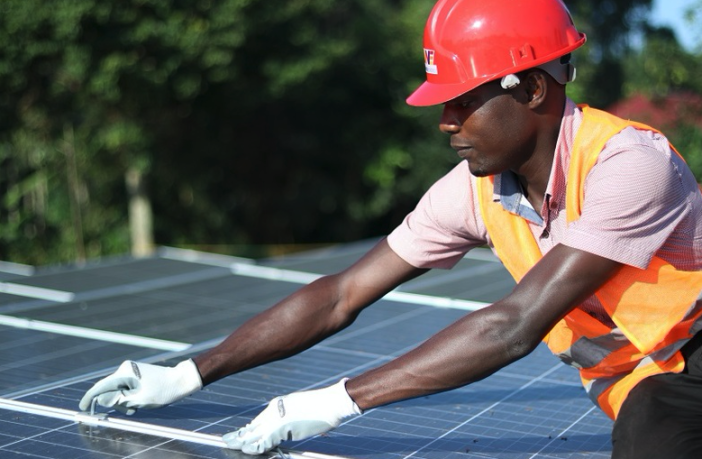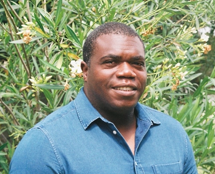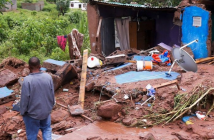Opinion
- There is a just energy transition happening in South Africa alright, but it is a just transition of the rich.
- The government can make it a just transition of the majority by creating a public-private partnership where it subsidises rooftop photovoltaic (PV) systems, or solar power systems.
We need all hands on deck to help save Eskom and this is not an overstatement. South Africa is currently gripped by furious debates about the power grid and what to do with the embattled power utility.
As Eskom has dialled up load shedding from Stage 3 to Stage 4 and then to Stage 6, some angry commuters and municipal managers, especially those in the opposition, have been wondering why the government isn’t getting rid of Eskom so that the private sector can get on with it. I cannot count the talking heads that I have seen on TV spitting vituperation to the effect that everything the ANC touches, dies: Eskom, SAA, Prasa, Denel… Bafana Bafana used to come up in the discussions every now and then, but not anymore.
The ANC has not exactly covered itself in glory, but in its defence, only 36% of the country had access to power in 1994 and it inherited a broke economy that could not exactly afford the vast outlay on power stations. However, they had time to do something, and they dithered.
Former president Thabo Mbeki later apologised for dilly-dallying on increasing the country’s energy capacity and worked with Eskom to approve over 13 projects worth in excess of R200-billion to double South Africa’s energy capacity by 2017. The programme’s flagship projects, Medupi and Kusile, were going to be among the biggest coal-fired power stations on the planet and would generate 9,600MW of electricity when completed (i.e. more than the installed capacity of Namibia, Zambia, Zimbabwe, Mozambique, Eswatini, Botswana and Lesotho combined).
Through this decision, the ANC positioned itself within the prevailing ontology of the former apartheid government and many other governments around the world for that matter — development through grand structuring projects, the dynamos that power entire sectors and communities, ones that people can look at with awe and reverence, like Ozymandias’ statue.
Medupi and Kusile accumulated the flaws that we have all heard about, the corollary of that being of course projects that are not delivering at optimum levels (Kusile especially). The population has continued to grow, the needs of the services and manufacturing sectors have also grown, which all means that South Africa needs more power to keep the lights on.
The other grand projects that the country was banking on are going to be delayed, just like Medupi and Kusile. We already know that very little of the Risk Mitigation IPP Procurement (RMIPPP) programme has materialised, the Renewable Energy IPP Procurement (Reippp) has many delays, Grand Inga in the DRC does not have the financial backing that it needs and so on and so forth, which all means that to get out of load shedding, South Africa needs to think differently.
South Africa needs to adopt a different mantra and ontology, one that disperses power and decision-making rather than centralising it on massive structuring economic dynamos. The discussions around updating the Integrated Resource Plan announced by the government should help bed in this new approach.
An opportunity to help South African households help Eskom
The mood in urban areas has not been good at all as South Africa hovers between Stages 4 and 6. Although the ANC recently backtracked on calls to accelerate installation of renewables, spokesperson Pule Mabe appeared on Thabo Mdluli’s show on Newzroom Afrika last week Thursday and said that all South Africans have to play a role in solving the country’s energy challenges. In his words, “it’s all hands on deck!”
This call should have been made sooner. Everybody has a role to play in helping make load shedding history. It begins with the government but everybody must play a role — and municipalities and the private sector especially must start playing a more active role. I will circle back to that in a moment.
First to the government’s responsibility. Pule Mabe is right to argue that we need “all hands on deck”. However, space has to be created to make that possible. I have argued consistently that the government has a unique opportunity to turn to the people of South Africa to make load shedding history.
The Citizen recently did a study on the cost of installing a rooftop PV system for an average-sized family home which shows that the outlay is anything between R71,000 and R287,000 depending on the quality of inverters etc that one uses. The Mail & Guardianhas noted that there is an explosion of rooftop PVs around the country. However, like Wits University’s Professor Lumkile Mondi noted recently, there is a just transition happening in South Africa alright, but it is a just transition of the rich.
Jan Oberholzer and Sikonathi Mantshantsha have made many attempts to show the public that one of the main reasons for load shedding is the age of Eskom’s fleet, arguing that we cannot expect 50-year-old machines to run like new ones. They are right — but the government can and should play a lead role here.
The South African government can make it a just transition of the majority by creating a public-private partnership where it subsidises rooftop PVs. Banks can pick up another bit of the chunk and participating families then have enough time and help to afford the systems that they need to keep the lights on.
When Eskom runs its open-cycle gas turbines (OCGT) during load shedding, it uses about nine million litres of diesel per day. In a recent press conference, Eskom CFO Calib Cassim suggested that Eskom was likely to spend about R6-billion on diesel for the year to 31 March 2022.
If the South African government allocates say about R10-billion to give 200,000 households R50,000 each for rooftop PVs, that will help stop Eskom flogging so much money on diesel. Instead of whining about what the government is not doing right, banks can step in with another 20 or 30% per household and that way, we add another few thousand to the grid very quickly, owned by families and not large corporations.
Last week, Public Enterprises Minister Pravin Gordhan mentioned that there was potential corruption with diesel loads. He mentioned that there were suspected cases of tankers driving into power stations, signing off on registers and then taking off without delivering their load of diesel.
The minister also mentioned that load shedding is often linked to bad coal being delivered at power stations. South Africa is a coal exporting country and demand for coal has exploded following Russia’s invasion of Ukraine. Nothing stops South African mines from selling their best stock to foreign nations, unless a law specifically obliges them to sell it to Eskom. Remember that Australia recently had load shedding for this specific reason. The easy way around all this is more renewables!
Municipalities must come to the table now
A number of mayors have been very vocal about load shedding. I keep hearing mayors say that they cannot wait to sign off-take agreements with the companies that eventually set up 100MW power plants.
This is a surprising lack of ambition, if you ask me. It is just a lot of grandstanding, all huff and no puff.
There are things that mayors can do now to keep more lights on, especially in the larger metros. Let’s start with putting up wind farms or solar cells to power traffic lights. Many African countries have already gone that route.
There was a lot of media coverage when South Africa installed its first solar-powered traffic light. Then the idea just went cold. Hard-working people do not need to spend an extra two hours per day in traffic, stewing about inflation and load shedding and analysing the pros and cons of “I’m leaving” or “I’m staying”. Mayors do not need the government to keep the lights on in more intersections, especially the really busy ones.
The arguments about what happens when the sun doesn’t shine are just academic at this stage. The real question, as I see it is: do we need to keep more lights on, especially when people and businesses need them the most?
The answer is yes of course, and if that is the answer, why are more municipalities not making efforts to cover absolutely every parking lot with solar panels as well? What are they waiting for? If you have only R10-million rand now — well, start with R10-million then! Today. Some retailers and others in the hotel industry have already covered their parking lots with solar PVs. That may not solve the problem entirely, but it is a step in the right direction. Municipalities should aim for a radical expansion of such initiatives.
Changing how we build
Arguably the most important change that we can make is how we build houses. The reason why the heaters all come out at the slightest hint of cold weather is because there are so many gaps in our doors and windows. Our buildings are just not weatherised to keep out the cold and heat. Property developers need to take urgent steps to build better.
It will certainly cost more money, but the recent floods in Durban and load shedding all tell us that how we build will play a major role in how we grow — and how we keep the lights on!
Author: Dr Roland Ngam
Dr Roland Ngam is programme manager for climate justice and socioecological transformation at the Rosa Luxemburg Foundation, Southern Africa.The views expressed are not necessarily those of the Rosa Luxemburg Foundation.
Disclaimer: The articles expressed in this publication are those of the authors. They do not purport to reflect the opinions or views of Green Building Africa, our staff or our advertisers. The designations employed in this publication and the presentation of material therein do not imply the expression of any opinion whatsoever on the part Green Building Africa concerning the legal status of any country, area or territory or of its authorities.
















